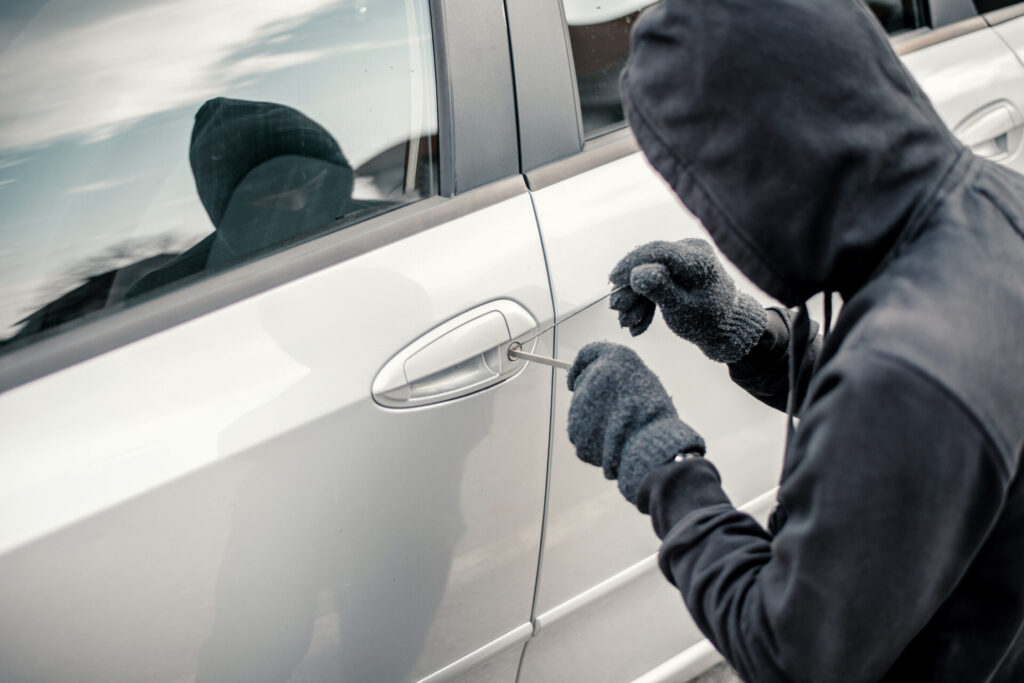With a car being stolen every six minutes in Canada, chances are you know somebody who’s been a victim. Maybe you know someone who was even unlucky enough to have their replacement car stolen. No province seems immune to rising auto theft rates: Ontario and Quebec have seen 48% and 50% increases. Meanwhile, Alberta has seen an 18% increase, and Atlantic Canada has reported a 34% increase in thefts. In Canada, auto theft claims amounted to more than $1 billion in last year. From car owners to law enforcement bodies to provincial and federal governments, it’s time to step up our defence strategies to prevent these numbers from continuing to rise.
Are you worried about your car being stolen or broken into? You’re not alone.
Many Canadians are concerned about auto thefts – regardless of whether they have experienced it. A CAA Insurance public opinion survey conducted in late 2023 showed that 49% of Canadians were worried about their cars being broken into and 39% were concerned about their car being stolen. Not surprisingly, the more urban the location, the greater the concern grew. More than 50% of those surveyed felt that insurance companies should be primarily responsible for educating Canadians about theft prevention options, while 38% felt that responsibility belonged to local law enforcement.
Car owners are taking preventive measures to keep their cars safe.
The CAA Insurance Company survey showed that Canadians are doing their part to help control auto theft. The poll showed that 81% of car owners keep their vehicles locked at all times – but conversely, that means one in five Canadians are still not securing their vehicles. The survey also showed that 77% don’t keep valuables in their car, 34% park their vehicles in a garage, 33% have factory-installed anti-theft systems, and around 20% have installed sensor lights or video cameras monitoring their driveway or garage. While we have made inroads, there’s still room for improvement in how we Canadians secure our cars.
Elliott Silverstein, Director of Government Relations at CAA Insurance states, “One of our company’s key focuses for 2024 is to educate consumers about ways to protect themselves against auto theft. Insurance companies, governments and local law enforcement need to each do their part to get control over this so that Canadians don’t pay the cost of auto theft in the form of higher insurance rates.”
The impact of car theft is widespread. Provincial governments are allocating their budgets to try dismantling car theft rings. The justice system and police forces are being kept busy with the mounting theft chases and cases. Even car manufacturers have been affected. There has been a call to update the vehicle standards in Canada—something that hasn’t undergone a review since 2007.
Is your vehicle on the most stolen list?
If you think only luxury vehicles have been the targets, think again. A recent report by Équité Association, a not-for-profit organization that works to prevent insurance fraud in the auto industry, shows that the top ten most stolen vehicles range from cars to SUVs and less expensive to luxury models. Moreover, the list varies by province across the country. For instance, Ontario’s top five stolen vehicle models include Honda CR-Vs (2020), Lexus RX series (2020), Dodge Ram 1500 series (2022) and Toyota Highlanders (2021). Meanwhile, in the Atlantic provinces thieves are favouring Dodge Ram 1500 series (2017), Chevrolet/GMC Silverado Sierra 1500 series (2018) and Ford 150 Series (2010).
Why are so many vehicles being stolen?
When fewer new vehicles were made during the pandemic slowdown, demand rose sharply – especially overseas. This is, in part, why stolen vehicles are often exported to places where they can fetch double their Canadian street price. A shortage of precious metals such as nickel, platinum and rhodium is another reason for the increase in thefts. These materials are currently more valuable than gold. Many cars are being stolen just for their parts, with catalytic converters being the most sought-after since they contain around $200 worth of platinum alone.
Yet not all stolen cars are destined to go overseas. Every vehicle has its own vehicle identification number (VIN) or QR code that’s usually displayed on the driver’s windshield or door jamb. This unique number is a way for consumers to track accident repairs on a car to ensure its fair resale value, and for insurance companies to determine your premiums. VINs are also a way to ensure you’re not buying a stolen car. Today’s thieves are “re-vinning” vehicles with fake VIN numbers to sell cars closer to home, where unsuspecting buyers are unaware that their “new” car is actually a stolen vehicle.
They say it takes a village.
While car owners are stepping up to help, the auto theft issue has become so big that the Ontario government claims it will take the entire country to reign it in. The province’s 2023 report called upon the Canada Border Services Agency, the RCMP, Montreal and Halifax port authorities and major rail and shipping container companies to join the fight to curb vehicle theft. Meanwhile, Ontario has committed $51M to police over the next three years. With stakeholders including provincial and federal governments, local and border police, insurance companies, vehicle manufacturers and car owners themselves coming at the problem from different angles, hopefully, through collaboration vehicle thefts will begin to trend downwards.


